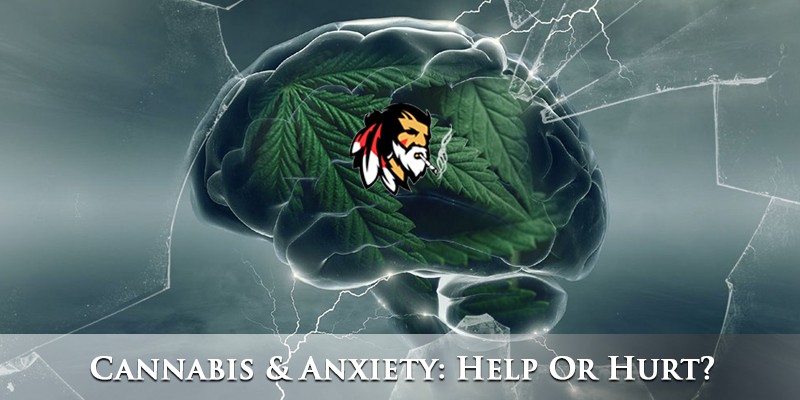Cannabis
Cannabis & Anxiety: Help Or Hurt?
It’s safe to bet that either you know someone who uses cannabis to treat anxiety, or that you do so yourself. Anxiety is one of the most common symptoms for which patients turn to medical cannabis, and yet anxiety is also, paradoxically, one of the most frequently reported side-effects of cannabis consumption. It seems like this isn’t something that we can have both ways, so what is the truth? How exactly do cannabis & anxiety relate?
WORD ON THE STREET
Multiple studies have demonstrated a clear connection between symptoms of anxiety and cannabis use. Consider one particular study executed by Mohammad R. Hayatbakhsh, M.D., et al, titled “Cannabis and Anxiety and Depression in Young Adults: A Large Prospective Study.” This ambitious study followed 3,239 Australian young adults (roughly half of whom eventually used cannabis) from birth until age 21. After controlling for potentially confounding factors, the researchers found that subjects who first tried cannabis by age 15, and who were consuming cannabis frequently at age 21 were significantly more likely to report symptoms of anxiety and depression. Moreover, the likelihood of a cannabis user reporting these symptoms is essentially identical regardless of whether or not that individual also used other illicit drugs. While this may initially appear damning, there are a number of points to consider.
The most immediately relevant consideration is that the researchers in the above study succeeded only in identifying a correlation, and fell short of proving causation, between cannabis and anxiety. In other words, they demonstrated (quite convincingly, I might add) that the variables of cannabis and anxiety are related, but not that one causes the other.
CHICKEN & EGG
Despite this, it is clear from reading their conclusions that the researchers assumed cannabis led to anxiety. For example, they speculate that “large doses of cannabis may affect a variety of neurotransmitters in a way that produces depressive symptoms” and “that frequent use of cannabis may lead to adverse social and psychological consequences [such as school dropout, job loss, and involvement in crime] that are associated with the development of mental health impairment.” They do not, however, directly address the possibility that it is symptoms of anxiety which lead a person to consume cannabis in the first place. This bias seems to have been the norm in the scientific community, at least prior to recent years and developments in the field of medical cannabis research.
A more objective (and exceptional) stance was taken by researchers from the University of Sao Paulo, in a 2009 study which involved the systematic review of medical literature. As to their results, they state, “Frequent cannabis users consistently have a high prevalence of anxiety disorders and patients with anxiety disorders have relatively high rates of cannabis use. However, it is unclear if cannabis use increases the risk of developing long-lasting anxiety disorders.” In other words, what came first: the chicken or the egg?
WHAT WE KNOW
One thing that is clear is that anxiety can indeed be a side-effect of cannabis consumption. In some cases this is due to feelings of paranoia felt after consuming THC, and in other cases may simply be an exacerbation of existing symptoms—remember that a certain level of anxiety is normal, so an increased heart rate following cannabis consumption could make the subject feel more anxious, raising anxiety levels to a problematic level. However, these kinds of reactions are not experienced by all users. In fact, two people may react entirely differently to the same strain after sharing a joint.
While the exact mechanisms involved in cannabis’ treatment and/or creation of anxiety symptoms have yet to be conclusively proven, we have plenty of anecdotal evidence that countless people do find relief from anxiety symptoms in the short term by using medical cannabis. A 2018 study confirmed this, basing their findings on nearly 12,000 self-reports on the popular app Strainprint. In so many words, the researchers from the University of Washington concluded that certain cannabis strains could “significantly” reduce feelings of anxiety in the short term, though they saw no evidence of it serving as an effective long term treatment. Essentially, cannabis might relate to anxiety-like ibuprofen relates to migraines—the one might alleviate symptoms of the other, but it can’t resolve the underlying cause.
Therefore, while cannabis might help treat anxiety in the short term, medical professionals advise against relying on cannabis as a sole treatment, considering that other evidence has linked prolonged use to depression and other conditions, perhaps even anxiety itself. Furthermore, there are treatment options (such as learned coping strategies) which may, in fact, reduce anxiety in the long term, and there is a reason to suggest that the short term fix provided by cannabis may reduce one’s likelihood of seeking out other methods.
WHAT WORKS BEST
If you decide to use cannabis as a short term treatment for anxiety, you should bear in mind that all strains are not equal in this regard. When people report increased anxiety after consuming cannabis, this response is normally due to a high THC content. Strains often cited as being best for treating anxiety tend to be those with high-CBD and low-THC content (we’ve written about the interesting benefits of CBD before, check out this article). While more research is needed to conclusively establish this connection, ample anecdotal evidence points the anxiety sufferer toward strains high in CBD for best relief. If you feel that increased anxiety is less of a concern for you, try strains like Granddaddy Purple or Jack Herer, both of which have well-established calming effects.
CONCLUSION
Cannabis and anxiety have a complicated relationship. While there is plenty of evidence that cannabis can help relieve feelings of anxiety in the short term, there is as of yet no evidence that it can be used as a treatment in the long run. In fact, medical professionals are in disagreement as to whether cannabis might, in fact, contribute to anxiety disorders. Until more research is done, people seeking relief from anxiety should only consider cannabis as a short-term, band-aid-like, solution, while simultaneously exploring other treatments. CBD strains are best suited for this use.


